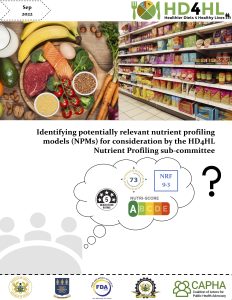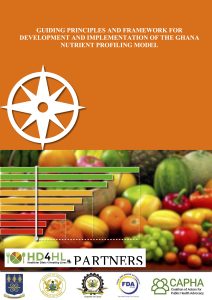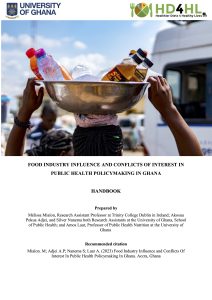
This report summarizes the approaches deployed to identify potentially relevant NPMs for consideration to suit Ghana's need. Three systematic reviews of existing nutrient profiling models were screened to identify best fit-for-purpose models for Ghana. The report concluded, with justifications, on the top three NPMs that should be considered by the Nutrient Profiling Development sub-committee of the HD4HL Project Multi- Stakeholder Technical Task Team (M3T).

This document sets out the guiding principles and framework for developing and applying a NPM to underpin food-based polices in Ghana. Referred to as a double-duty policy bundle, such policies aim to promote healthy diets and prevent malnutrition in all its forms. This document benefits from existing guiding documents including those developed by the WHO to articulate the principles for Nutrient Profiling and Front of Pack Labelling (FOPL).

The handbook offers insights into how the industry impacts public health policies while addressing conflicts of interest, with examples from Ghana. Its purpose is to educate Ghanaian policy actors, referred to as the M3T, or Multi-Stakeholders Technical Task Team, which plays a vital role in shaping food-based policies in the country. Designed in anticipation of potential efforts to influence policy development, the handbook promotes best practices for developing food policies for Ghana through the HD4HL project. Its content has been applied in a workshop to equip policy actors with skills necessary to identify tactics that qualify as industry influence and situations leading to conflicts of interest, enabling them to manage these effectively. The creation of the handbook was informed by expert knowledge and a review of relevant peer-reviewed literature along with mainstream media coverage. Furthermore, it includes cases and arguments that counter the claims made by the food industry.
